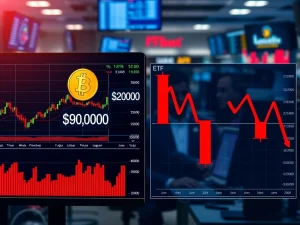Malaysia Crypto Regulation: A Bold Leap to Streamline Digital Asset Listings

Are you ready for a significant shift in how digital assets are brought to market? Malaysia, a nation increasingly embracing the digital economy, is on the cusp of a groundbreaking change in its approach to Malaysia crypto regulation. The Securities Commission Malaysia (SC) is proposing a progressive framework that could dramatically simplify the process for listing cryptocurrencies on local exchanges. This move signals a forward-thinking stance, aiming to foster innovation while maintaining robust oversight. Let’s dive into what this means for the crypto landscape in Malaysia and beyond.
What’s Changing in Malaysia’s Crypto Regulation Landscape?
The Securities Commission Malaysia (SC) has initiated a public consultation on a proposal designed to liberalize the framework for listing digital assets. Currently, exchanges need explicit approval for each asset they wish to list. The new proposal suggests a shift, allowing certain cryptocurrencies to be listed without prior approval, provided they meet specific, predefined criteria. This is a significant pivot, reflecting a desire to balance market agility with regulatory prudence.
The primary objectives behind this proposed easing are clear:
- Accelerate Time-to-Market: Reducing bureaucratic hurdles means new, compliant digital assets can reach investors faster.
- Increase Exchange Accountability: With greater autonomy comes greater responsibility. Exchanges will be held more accountable for their listing decisions.
- Widen Product Offerings: A more streamlined process could lead to a broader array of digital assets available for trading, catering to diverse investor interests.
This initiative underscores Malaysia’s commitment to adapting its financial landscape to the evolving digital asset space, aiming to create a more dynamic and accessible crypto market.
Streamlining the Crypto Listing Process: A New Era?
The core of the SC’s proposal revolves around empowering cryptocurrency exchanges to list digital assets that meet specific, objective criteria without the need for individual regulatory approval. This change promises to significantly streamline the crypto listing process, making it more efficient and responsive to market demands. But what exactly are these criteria that would grant an asset this ‘fast-track’ listing?
For a digital asset to qualify for listing without explicit SC approval, it must:
- Undergo Security Audits: The asset must have publicly available results from comprehensive security audits, ensuring its underlying technology is robust and secure.
- Traded on FATF-Compliant Platforms: It must have been traded for at least one year on a platform that adheres to the Financial Action Task Force (FATF) standards. This ensures a level of established liquidity and regulatory compliance history.
By placing the onus on the exchanges to conduct thorough due diligence and adhere to these guidelines, the SC is fostering a more mature and responsible ecosystem. This approach encourages self-regulation within the industry while still providing a safety net for investors.
Navigating the Digital Asset Framework: Opportunities and Risks
While the SC aims to liberalize the listing process, it’s also keen to gather feedback on certain categories of digital assets it deems ‘higher risk.’ This thoughtful approach to the evolving digital asset framework highlights the regulator’s commitment to responsible innovation. The SC’s consultation paper specifically seeks industry input on whether these higher-risk assets should be permitted for trading, and under what conditions.
The categories under scrutiny include:
- Privacy Coins (e.g., Monero – XMR): The SC expresses concern over their heightened privacy features, which could potentially be exploited for illicit activities like money laundering and terrorism financing due to lack of transparency.
- Memecoins: Assets designed to follow internet trends or popular culture are flagged due to their extreme volatility, which can lead to significant and rapid losses for investors.
- Stablecoins and Tokenized Assets: While generally seen as lower risk, the regulator is still seeking input on their specific treatment within the framework.
- Exchange Tokens: These tokens, often issued by exchanges themselves, raise concerns about potential conflicts of interest.
- Nascent Utility Tokens: Assets with low market demand are considered higher risk due to their illiquidity and speculative nature.
This open dialogue allows the SC to gain crucial insights from industry participants, ensuring that future regulations are both effective and practical, balancing market growth with investor protection.
Tighter Crypto Exchange Rules: Enhancing User Protection
Alongside easing the listing process, the SC is proposing more stringent crypto exchange rules concerning governance and client asset security. This dual approach aims to build greater trust and stability within the Malaysian digital asset ecosystem. Protecting user funds is paramount, and these new rules reflect that commitment.
Key proposed enhancements to governance and custody include:
- Segregation of User Assets: Exchanges would be required to clearly separate client assets from their operational funds, providing a critical layer of protection in case of insolvency.
- New Minimum Financial Criteria: Digital exchange operators will need to meet stricter financial requirements, ensuring they have sufficient capital to operate responsibly.
- Mitigation Policies: Exchanges must implement robust policies and procedures to mitigate the risk of loss or misuse of user funds and facilitate prompt repayment in the event of operational issues or insolvency.
- Designated Senior Management: A senior management member residing in Malaysia must be identified and held responsible for the administration of customer wallets, ensuring local accountability.
- Custodian Registration: Crypto exchanges that custody user assets will either need to register as a digital asset custodian themselves or engage with an SC-registered custodian to provide these services.
These measures are designed to significantly enhance the security and integrity of digital asset holdings, providing greater peace of mind for investors operating within the Malaysian market.
The Debate Over Privacy Coins and Other High-Risk Assets
The Securities Commission Malaysia’s consultation paper specifically highlights concerns regarding privacy coins like Monero (XMR). Their enhanced anonymity features, while appealing to some users, present a significant challenge for regulators aiming to prevent illicit financial activities. The SC’s focus here is on the potential for these assets to be used in money laundering and terrorism financing due to their inherent lack of transparency.
Beyond privacy coins, the SC is also seeking input on the risks associated with other asset types:
- Memecoins: Their value is often driven by social media trends and speculation, leading to extreme price volatility that can result in substantial losses for retail investors.
- Nascent Utility Tokens: These are often early-stage projects with low market demand, making them highly illiquid and susceptible to price manipulation or project failure.
The regulator’s proactive approach in seeking public and industry feedback on these categories demonstrates a nuanced understanding of the crypto market’s complexities. It aims to strike a balance between fostering innovation and safeguarding the financial system from potential misuse.
A Balanced Approach for Malaysia’s Digital Future
Malaysia’s proposed changes to its crypto regulatory landscape represent a significant step forward. By simultaneously easing the crypto listing process for compliant assets and tightening governance and custody rules, the Securities Commission Malaysia is adopting a balanced and pragmatic approach. This dual strategy aims to foster a more dynamic and accessible digital asset market while ensuring robust investor protection and preventing illicit activities. The ongoing public consultation is a crucial opportunity for industry stakeholders and the public to contribute to shaping a future-proof digital asset framework for Malaysia, solidifying its position as a progressive player in the global cryptocurrency space.









